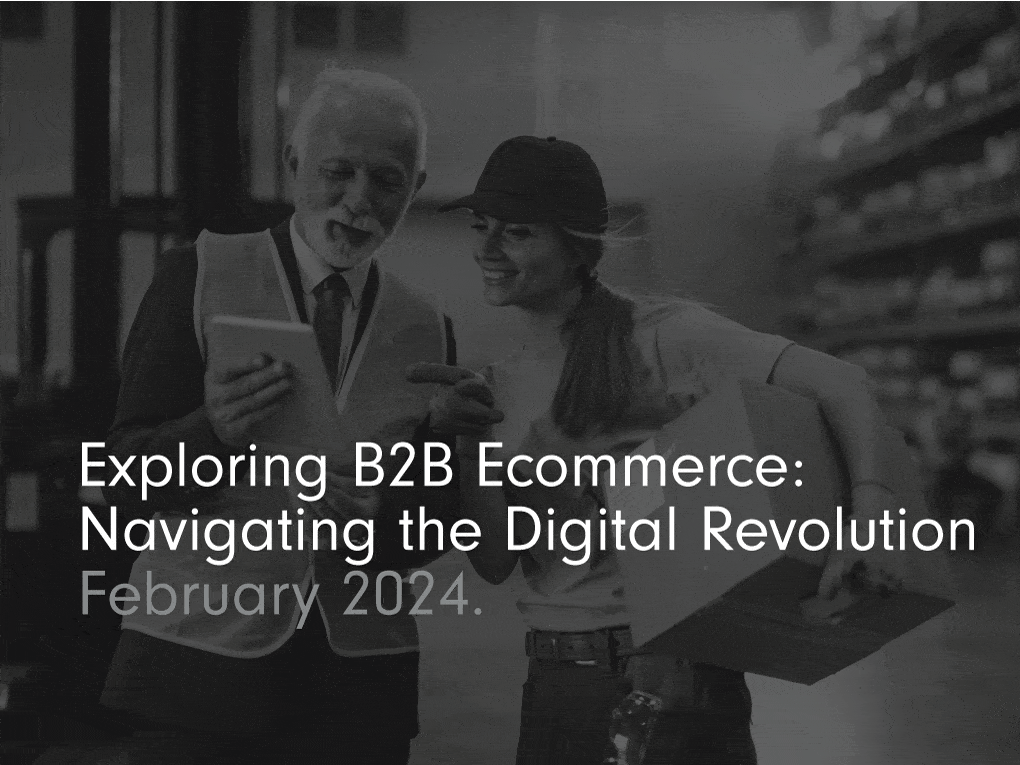Exploring B2B Ecommerce: Navigating the Digital Revolution

The landscape of buying and selling in the business world is constantly evolving. With the advent of digital transformation, the shift towards online platforms has become increasingly prominent. In this pivotal movement, B2B ecommerce has emerged as a groundbreaking avenue for commercial transactions. It offers remarkable opportunities for businesses looking to expand their reach and efficiency.
This article intends to shed light on what B2B ecommerce is, explore its key components, and provide actionable insights for sellers. By the end of this read, you’ll gain a clear understanding of B2B ecommerce and how it can transform your company’s operations. As we step into this exploration, let’s begin with the basics.
What Is B2B Ecommerce?

At its core, B2B ecommerce refers to online transactions between businesses. Where one company provides products or services to another for reselling, use in production, or general business operations.
B2C (business-to-consumer) ecommerce, focuses on direct sales to the end consumer. B2B ecommerce involves a more complex sales process with larger transactions, longer sales cycles, and a more relationship-driven approach.
The Rise of B2B Ecommerce Platforms
For a B2B ecommerce platform to operate effectively, it needs to be more than a digital storefront. It requires advanced functionalities specifically tailored to complex B2B transactions. These platforms have tools for managing large orders and offering different prices based on the amount purchased and customer groups.
The success of a B2B ecommerce platform ultimately depends on its usability. A streamlined and intuitive user interface is necessary to facilitate fast and efficient transactions. Additionally, features like saved carts, order templates, and self-service tools provide added convenience for customers while reducing manual efforts for businesses.
Additionally, they boast robust customizability features, enabling the tailoring of products and services to meet specific client needs. These ecommerce solutions excel at promoting smooth communication, streamlining transactional negotiations, and displaying detailed product specifications in a secure digital environment.
Why Ecommerce for B2B?

Building and maintaining customer relationships is inherently different in an online setting. Implementing CRM systems and email marketing can help maintain the personal touch necessary for B2B interactions. Providing top-notch customer service through prompt support and tailored solutions will also foster lasting relationships.
There are numerous compelling reasons for B2B organizations to venture into ecommerce. Some of these include:
- Global Market Access: B2B ecommerce breaks down geographical barriers, allowing sellers to reach customers anywhere in the world.
- Increased Efficiency: Digital commerce automates various sales processes, such as order processing, inventory management, and customer support, leading to enhanced operational efficiency.
- Data-Driven Insights: B2B ecommerce platforms provide valuable data that can be used to optimise marketing strategies, personalise customer experiences, and predict future trends.
- Scalability: As your business grows, a robust ecommerce platform scales with you, supporting increased traffic, orders, and product lines without sacrificing performance.
What Are The Challenges and How To Overcome Them?

Despite the apparent advantages, B2B ecommerce also brings its set of challenges. Key concerns revolve around the integration of complex sales processes, managing customer relationships online, and ensuring data security. Here’s how to effectively address these challenges:
Integration of Complex Sales Processes.
B2B ecommerce platforms must-have tools that mimic face-to-face interactions to handle complicated sales processes. Features like live chat support, detailed product specs, and comprehensive FAQs can help bridge the gap between online and offline sales.
Managing Customer Relationships Online.
Building and maintaining customer relationships is inherently different in an online setting. Implementing CRM systems and email marketing can help maintain the personal touch necessary for B2B interactions. Providing top-notch customer service through prompt support and tailored solutions will also foster lasting relationships.
Ensuring Data Security.
A significant aspect of establishing credibility in B2B ecommerce is ensuring the security of customer data. Your platform will be secure from breaches and gain trust from clients through advanced encryption and following data protection laws. You can also provide security certifications and audits to give customers peace of mind.
Efficient Warehouse Operations.
In today’s fast-paced business world, B2B ecommerce has become a vital component of modern-day supply chain operations. The importance of streamlined warehouses cannot be overstated when it comes to b2b ecommerce. A successful solution ensures that products are delivered to the customer in a timely, efficient, and cost-effective manner.
This requires a smooth and organized warehouse operation that prioritises order accuracy, inventory tracking, and efficient picking and packing processes. Companies that focus on these elements in their B2B ecommerce warehouses can gain happier customers, more sales, and lower expenses.
Implementing a robust Warehouse Management System (WMS) is essential to achieving these objectives in B2B ecommerce operations. A WMS streamlines the process by providing real-time data on inventory levels, optimising picking routes, and automating the shipping and receiving tasks.
By reducing errors and preventing delays, a WMS directly enhances productivity, ensuring that customers receive the right products at the promised time.
Moreover, the data analytics capabilities of a WMS enable businesses to make informed decisions, anticipating demands and adjusting inventory accordingly, which in turn, minimizes holding costs and maximises warehouse space utilisation.
Streamlining Operational Systems for B2B Ecommerce.
The digital transformation that encompasses B2B ecommerce is not without its operational hurdles. Companies must be equipped with robust Enterprise Resource Planning (ERP) systems that integrate seamlessly with their ecommerce platforms. To ensure real-time data synchronisation across sales, accounting, inventory management, and customer service channels. A pivotal challenge is the implementation of omnichannel strategies, which require meticulous data orchestration to provide a cohesive customer experience.
Moreover, international B2B sales require robust logistics and compliance management systems to simplify cross-border transactions, currency conversions, customs duties, and multilingual customer communication. Collaborating with global logistics experts can demonstrate an organisation’s dedication to overcoming geographical and regulatory challenges, and establishing its leadership in the industry.
To address these challenges competently, companies must prioritise investments in cutting-edge technology and foster collaborations with top-tier software providers. The goal is to create a system that meets current needs and can adjust to future market shifts. This strategic foresight is essential for achieving a competitive edge in the fast-evolving arena of digital B2B commerce.
B2B Ecommerce Trends.

Keeping an eye on emerging trends is crucial for staying ahead in the fast-paced world of B2B ecommerce. Currently, some of the noteworthy trends include:
- Personalisation: Advanced algorithms enable platforms to offer personalized product recommendations and content, enhancing the buyer’s journey.
- Mobile Optimization: With more professionals using mobile devices for business purchases, having a mobile-optimized platform is non-negotiable.
- Use of AI and AR: Artificial Intelligence (AI) and Augmented Reality (AR) enhance the online experience by providing smart insights and realistic product visualisations.
- Sustainability: B2B customers are increasingly aware of environmental impacts, prompting sellers to offer sustainable solutions and eco-friendly products.
The Global Perspective.

The adoption of B2B ecommerce is not confined to any single market. Across the globe, businesses are recognising the need to digitise their sales channels to remain competitive. From Asia to Europe to the Americas, B2B ecommerce is becoming an integrated part of the global economy, offering unparalleled growth potential.
Global companies must consider international trade. They should also support different languages and offer various payment methods. This will help them reach a worldwide audience successfully.
Conclusion.
In conclusion, B2B ecommerce is a dynamic and pivotal domain within the larger framework of digital commerce. It’s an arena that rewards innovation, embraces technological advancements, and values customer relationships.
Whether you are a seasoned B2B seller or a company taking its first steps into the world of ecommerce, understanding and harnessing the power of B2B ecommerce platforms will be instrumental in positioning your company for future success.
For businesses ready to take that leap, remember that the transition to digital commerce can be a transformative journey. B2B ecommerce can help build a strong and globally relevant business with the right approach, tools, and mindset.
Companies must embrace change, educate themselves, and adapt their strategies to meet the ever-evolving demands of digital commerce. It’s an exciting time for B2B businesses, and the possibilities are boundless.